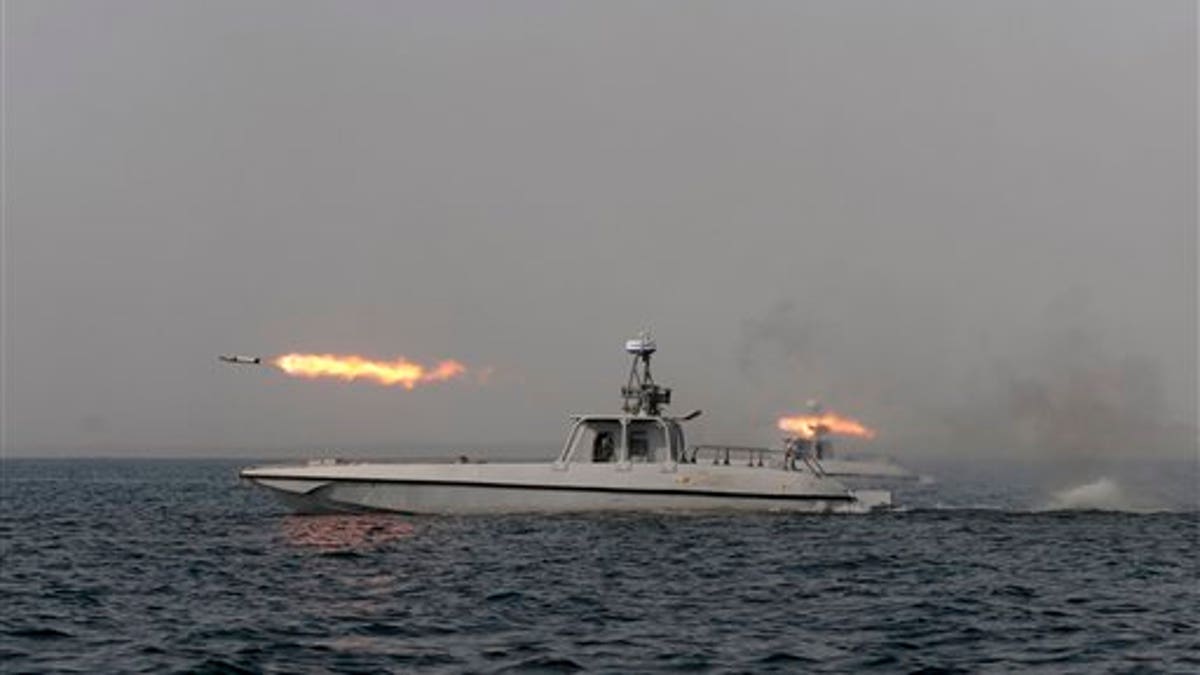
Dec. 30, 2011: An Iranian navy boat fires a missile in a drill in the sea of Oman. (AP)
TEHRAN, Iran – Iran backed down Saturday from its earlier threats to block the strategic oil route through the Strait of Hormuz, apparently confirming U.S. assertions that such threats packed more "bluster" than bite.
Talk of blocking the strategic oil route through the Strait of Hormuz is a discussion of the past, a commander of Iran's Revolutionary Guard said Saturday, but he said Iran had other, unspecified strategies for reacting to any Western aggression.
"Discourse about closing the Strait of Hormuz belongs to five years ago. Today's debate in the Islamic Republic of Iran contains new layers and the time has not come to raise it," Gen. Masoud Jazayeri said in comments posted Saturday on the Guard's website, sepahnews.com.
Jazayeri did not elaborate.
The latest developments came on the same day that the country's top nuclear negotiator announced Iran is proposing a new round of talks about its controversial nuclear program with the six world powers. The West recently imposed new sanctions over Tehran's uranium enrichment program, which is a potential pathway to making nuclear arms.
U.S. military officials had warned Wednesday that any attempt by Iran to disrupt oil shipments at the mouth of the Persian Gulf "will not be tolerated." Pentagon spokesman George Little described the Strait of Hormuz, as an "economic lifeline" vital to stability in the region.
And a spokeswoman for the U.S. Navy's 5th fleet warned Iran against disrupting shipments in the strait, saying the U.S. Navy keeps a "robust presence in the region" and is "ready to counter malevolent actions to ensure freedom of navigation."
Iranian officials had threatened to use the passageway to retaliate if the West imposes new sanctions targeting Tehran's oil exports over the country's suspect nuclear program.
"Closing the Strait of Hormuz is very easy for Iranian naval forces," Adm. Habibollah Sayyari told state-run Press TV on Wednesday. "Iran has comprehensive control over the strategic waterway."
On Tuesday, Vice President Mohamed Reza Rahimi also threatened to close the strait, cutting off oil exports, if the West imposes sanctions on Iran's oil shipments.
The rising tension has coincided with the Iranian navy carrying out a 10-day naval exercise, including dispatching warships and drones over the vital waterway. The strait is just 34 miles wide, and about 20 percent of the world's oil shipments pass through.
Western nations are growing increasingly impatient with Iran over its nuclear program. The U.S. and its allies have accused Iran of using its civilian nuclear program as a cover to develop nuclear weapons. Iran has denied the charges, saying its program is geared toward generating electricity and producing medical radioisotopes to treat cancer patients.
Iran is the world's fourth-largest oil producer, with an output of about 4 million barrels of oil a day. It relies on oil exports for about 80 percent of its public revenues.
Iran has adopted an aggressive military posture in recent months in response to increasing threats from the U.S. and Israel that they may take military action to stop Iran's nuclear program.
As the Pentagon warned Iran against taking any action in the Strait of Hormuz, a State Department spokesman said Tuesday that "obviously there's an element of bluster" to some of the Iranian comments.
The Associated Press contributed to this report.
